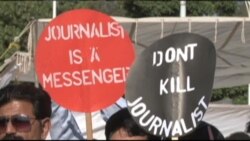Pakistan’s biggest news channel, Geo News, says its broadcasts are being blocked by cable operators in close to 90 percent of the country, despite having apologized to Pakistan's intelligence agency after accusing it of plotting an attack on a prominent GEO journalist.
Amnesty International says attempts to take Geo TV off the air represents a serious attack on freedom of expression in Pakistan. In an open letter to Prime Minister Nawaz Sharif, the human rights group called for an investigation into the country’s intelligence agency, ISI, over its alleged involvement in journalist attacks.
The recent standoff between GEO News, one of the strongest media players in Pakistan, and ISI began after Hamid Mir, a prominent journalist and Geo anchor, was shot at six times.
Mir spoke to VOA’s Ayaz Gul in Islamabad about ISI’s alleged tactics to block Geo.
"It is not only the freedom of the media, but the future of investigative journalism in Pakistan is also at stake," he said. "But I think that the majority of the professional journalists, majority of the working journalists they have not given up. I have not given up."
Geo accused ISI and its chief of plotting the attack on Mir. This provoked public anger against the TV channel, and rival channels also accused Geo of irresponsible reporting. Geo later apologized to ISI but the issue has not been resolved.
While journalists continue to face threats from different quarters in Pakistan, experts say Pakistani news media also needs to put its house in order.
"Basically it is the owners who are finalizing editorial policies of their channels," said Abid Suleri, a social policy analyst in Pakistan. "And if they decide not to enter into this blame game and this accusation and counter accusation, obviously one can see some sort of peace and some sanity. But unfortunately that is not going to happen."
Mir also deplores what he sees as a lack of journalistic ethics.
"There is no code of ethics for the media in Pakistan and that is why some non-professional people in this field are taking advantage of that," he said.
Those who attacked Mir are still on the loose, an irony experts say in the midst of this ongoing debate over press freedom.
"It is necessary for the state of Pakistan to come clean on this," Moeed Yusuf, who is with Washington’s Institute of Peace. "And then, of course, whatever the law allows in terms of actions against Geo, if it comes down to some extreme measure that is permissible, I don’t think that’s a smart move simply because the state hasn’t come clean as yet."
Mir says despite all the troubles and threats to his life, he will not leave the country and continue to work as an investigative journalist.
VOA's Ayaz Gul contributed to this story.
Amnesty International says attempts to take Geo TV off the air represents a serious attack on freedom of expression in Pakistan. In an open letter to Prime Minister Nawaz Sharif, the human rights group called for an investigation into the country’s intelligence agency, ISI, over its alleged involvement in journalist attacks.
The recent standoff between GEO News, one of the strongest media players in Pakistan, and ISI began after Hamid Mir, a prominent journalist and Geo anchor, was shot at six times.
Mir spoke to VOA’s Ayaz Gul in Islamabad about ISI’s alleged tactics to block Geo.
"It is not only the freedom of the media, but the future of investigative journalism in Pakistan is also at stake," he said. "But I think that the majority of the professional journalists, majority of the working journalists they have not given up. I have not given up."
Geo accused ISI and its chief of plotting the attack on Mir. This provoked public anger against the TV channel, and rival channels also accused Geo of irresponsible reporting. Geo later apologized to ISI but the issue has not been resolved.
While journalists continue to face threats from different quarters in Pakistan, experts say Pakistani news media also needs to put its house in order.
"Basically it is the owners who are finalizing editorial policies of their channels," said Abid Suleri, a social policy analyst in Pakistan. "And if they decide not to enter into this blame game and this accusation and counter accusation, obviously one can see some sort of peace and some sanity. But unfortunately that is not going to happen."
Mir also deplores what he sees as a lack of journalistic ethics.
"There is no code of ethics for the media in Pakistan and that is why some non-professional people in this field are taking advantage of that," he said.
Those who attacked Mir are still on the loose, an irony experts say in the midst of this ongoing debate over press freedom.
"It is necessary for the state of Pakistan to come clean on this," Moeed Yusuf, who is with Washington’s Institute of Peace. "And then, of course, whatever the law allows in terms of actions against Geo, if it comes down to some extreme measure that is permissible, I don’t think that’s a smart move simply because the state hasn’t come clean as yet."
Mir says despite all the troubles and threats to his life, he will not leave the country and continue to work as an investigative journalist.
VOA's Ayaz Gul contributed to this story.





